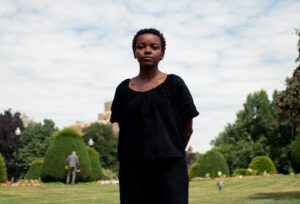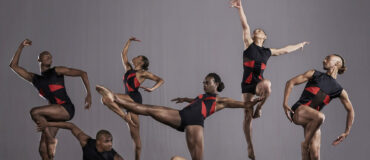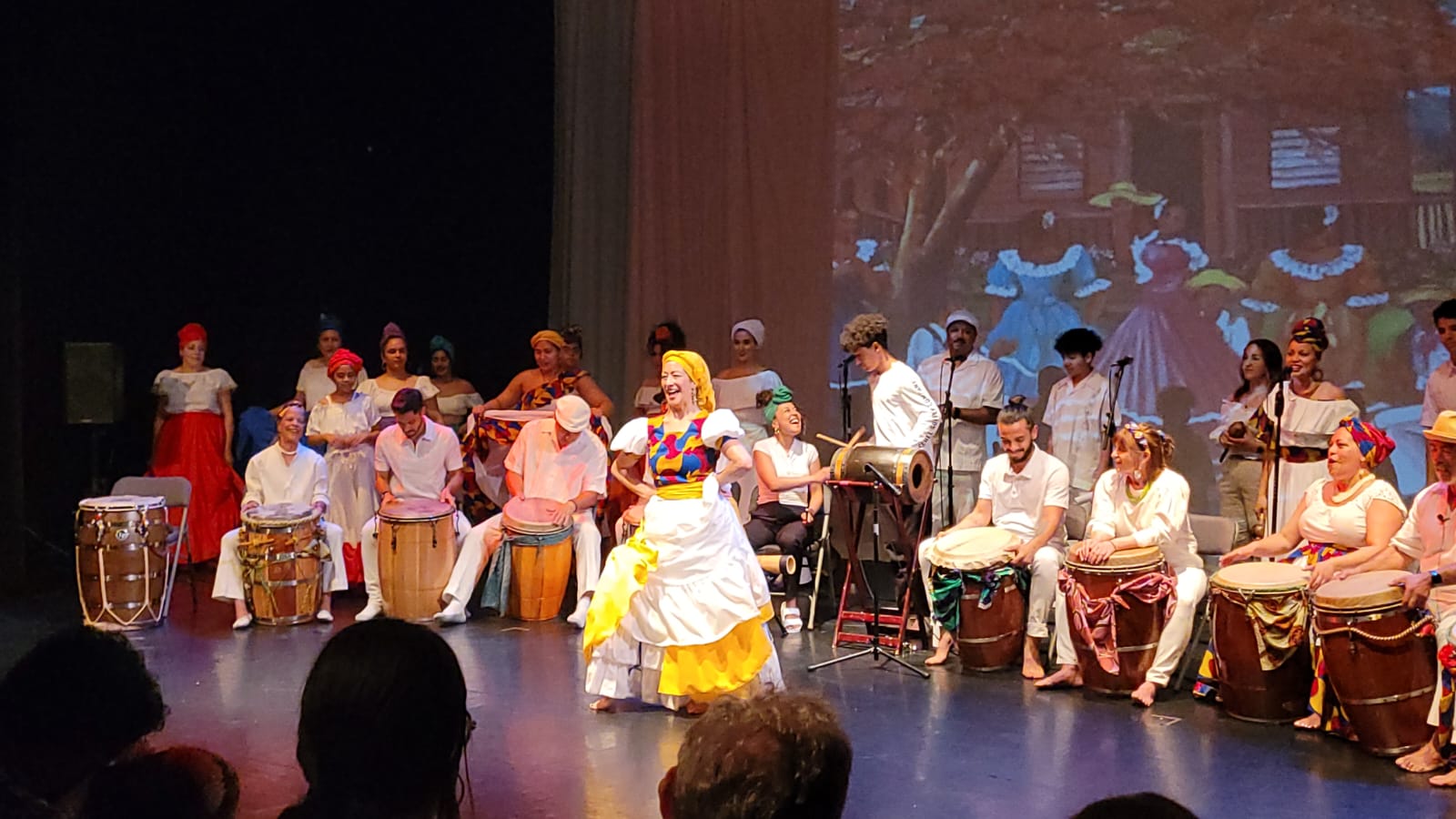Archiving Fellowships Blog: Jennifer Harge/Harge Dance Stories, Part 1
By Laila Franklin
Laila Franklin is a 2023 Archiving and Preservation Fellow with Jennifer Harge/Harge Dance Stories. Read more about the Fellowships here. This is the first part of Laila’s blog. Read the second part here.
Sharing and Protecting the Work of Black, Queer, Radical Women
I arrive to this work as a gentle witness.
My job is to hold a body of work and help make sense of it for the next person.
But this work is holding me.

Jennifer Harge and Marcia Black view the early organization of butcher paper archive. Courtesy of the author.
Jennifer Harge makes work that I know. It is familiar in the way that my great grandmother’s house is, or in the way that my accent becomes thicker when visiting my parents. It reflects a reality that I, too, live and dream inside of, one that feels tangled in ritual, mundanity, and a unique sense of corporeality. My proximity to the content of her work provides a clear entry to the organization of it. There is a logic that is already apparent to me; my work is a matter of making that logic legible. But with that legibility comes the responsibility of acknowledging the boundaries of the work. As I begin the process of assisting in the archiving of her body of work, I am guiding myself with these questions:
How do we simultaneously share and protect the work of Black, queer, radical women?
How do we approach a process of archiving in service to eventual artistic goals?
Jennifer Harge is a Detroit-based interdisciplinary choreographer, performance artist, and educator. Her work centers and is grounded in Black subjectivity, using Black feminist thought and reciprocal relationships to support the exploration of Black, queer life via performance, film, installations, and community gatherings. In this project with Dance/USA, I have been tasked with creating a pilot organizational/archiving method that supports Harge’s approach to creative process and long-term project development.

Photo Credit: Devin Drake. Pictured: Jennifer Harge in FLY | DROWN (Detroit Artist’s Market, 2019)
The starting point of this project was completed over the course of seven intensive days. We laid the foundation for an archival method that is designed to honor the interdisciplinary approach at play in the process materials Jennifer Harge creates. These materials are primarily handwritten notes, drawings, and graphs. In addition to Harge, I was joined in this process by two of Harge’s longtime collaborators and thought partners, Devin Drake and Miryam Johnson, and archiving mentor Marcia Black of Black Bottom Archives. Our approach to this project is deeply collaborative and experimental, leaning into the form of Harge’s work. She works with scale in thought and in material, pouring proclamations, instructions, questions, and dreams onto rolls of white butcher paper. The rolls are fragmented into sheets of varying lengths, written in varying orientations. Collections of papers can demarcate Harge’s body of work. Each distinct group of papers houses notes that outline a specific approach to making and/or content research. The pilot collection is a group of 30 individual sheets developed over the course of a 1-month residency. This collection is concerned with an approach to practice, which proved to be a helpful starting point as we began to consider the goals of this archive.

Final archive collection layout of butcher papers. Courtesy of the author.
The organization of this collection requires a standing knowledge of Black life and a nuanced frame of reference. The first couple of days of working were spent organizing the sheets in the warehouse space we worked in. They laid like a maze, or a puzzle, linking corresponding ideas by laying their sheets near one another, creating quadrants of broad categories and themes we found in these initial passes. Working with process notes means having to lean into the poetic. The content of these notes is not always straightforward and frequently employs informal citations. My own background in dance and overlapping research interests became useful tools. It also became imperative to have a working knowledge of Harge’s history of work, the processes she employs, and the communities she creates.
To know her work is to know Black life intimately. Her network of references grounds us in a particular physicality and spirituality that rests just outside of the bounds of language. With this in mind, we had to consider the goals of this archive carefully, as they would determine the methods we would develop for its organization. We knew early on that this would be a living archive – something that will be accessed frequently and in which reorganization will be permissible as it continues to grow. As I learned more about the collections, we determined that our time would be best served if we focused our efforts on the butcher paper process materials. We weren’t going to be organizing programs, letters, digital media, or even personal journals, only the large-scale process notes. While those other pieces of material were occasionally used for consultation, we wanted to focus on the large-scale process notes as the primary sources. This meant each sheet of paper was a container for individual thoughts to be archived independently of one another, regardless of the paper it lived on. That is to say, this process became about archiving literal text and not objects containing text. This poses a unique challenge and opportunity for project development.

Photo Credit: Bree Gant. Pictured: Amber Moore and Shanice Rollins in Jennifer Harge’s the (her)stor(ies) project, 2018)
The ethos of this project is wrapped up in prioritizing care. The notes we worked with arose from a deeply personal place and practice, therefore I took advantage of the fact that their creator, Jennifer Harge, was in the room with us as we completed this initial organization. Finding clarity in the notes also allowed for conversations about what we want to share and how. The archive itself may not be an open document but will aid in the creation of one – a larger writing project regarding her process and method of creation. So it is important that the archive is easy to navigate and edit once I depart from this iteration of the project. Each paper was photographed and cataloged with its corresponding ID number, category tags, and a description of the contents of the individual papers via AirTable. AirTable is a project management software we have adapted for our archive inventory. It allows us to see the most pertinent information about entries at a birds-eye-view, with the option of continuing to add more details as the archive continues to develop. Over the course of the next month, each paper will be transcribed.
The beauty of this project is its attention to detail and commitment to challenging form. The archive you create should not only be navigable but also serve the larger intent of the artist or organization. Taking time to slow down and assess goals and develop an approach that aligns with the ethos and proposed outcomes of the project creates a process ripe with creativity and discovery.
Header image: Photo by Kirk Donaldson. Pictured: Jennifer Harge leading University of Michigan Dance students in Harge’s “Studio A, will you die with me?” (Ann Arbor, MI 2019)
 Laila J. Franklin (she/her) is a dance maker, performer, teacher, administrator, and writer based in the unceded territory of the Massachusett and Pawtucket peoples (Boston, Massachusetts.) Her work extends from lineages of Black queer experimental dance makers, with a particular interest in postmodern improvisatory practices and aesthetics, and dance theater. In her work, she explores kinetic imagination through the rigor of juxtaposing virtuosic and intimate performances, seeking to make legible the (in)visibility of lived experience. Her performance/collaboration credits include work with Miguel Gutierrez, Melinda Jean Myers, Dr. Christopher-Rasheem McMilland, and Ruckus Dance. As a Fellow, Laila is looking forward to collaborating with Jennifer Harge/Harge Dance Stories to explore ways to bring further legibility to an embodied and culturally citational body of work, taking experiential approaches to transfer bodily archives to physical archives. Laila holds an MFA in Dance from the University of Iowa and a BFA in Contemporary Dance Performance from The Boston Conservatory. Photo credit: Bailey Bailey.
Laila J. Franklin (she/her) is a dance maker, performer, teacher, administrator, and writer based in the unceded territory of the Massachusett and Pawtucket peoples (Boston, Massachusetts.) Her work extends from lineages of Black queer experimental dance makers, with a particular interest in postmodern improvisatory practices and aesthetics, and dance theater. In her work, she explores kinetic imagination through the rigor of juxtaposing virtuosic and intimate performances, seeking to make legible the (in)visibility of lived experience. Her performance/collaboration credits include work with Miguel Gutierrez, Melinda Jean Myers, Dr. Christopher-Rasheem McMilland, and Ruckus Dance. As a Fellow, Laila is looking forward to collaborating with Jennifer Harge/Harge Dance Stories to explore ways to bring further legibility to an embodied and culturally citational body of work, taking experiential approaches to transfer bodily archives to physical archives. Laila holds an MFA in Dance from the University of Iowa and a BFA in Contemporary Dance Performance from The Boston Conservatory. Photo credit: Bailey Bailey.
____
We accept submissions on topics relevant to the field: advocacy, artistic issues, arts policy, community building, development, employment, engagement, touring, and other topics that deal with the business of dance. We cannot publish criticism, single-company season announcements, and single-company or single artist profiles. Additionally, we welcome feedback on articles. If you have a topic that you would like to see addressed or feedback, please contact communications@danceusa.org.
Disclaimer: Opinions expressed in guest posts do not necessarily represent the viewpoints of Dance/USA.





